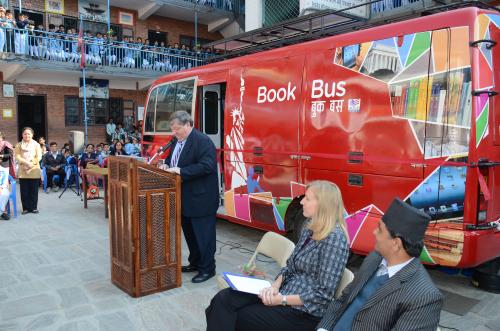
Traditional diplomacy is all about the ability of nations to project their power through a multifaceted ability to engage, influence others nations in order to pursue their national interests.But a less visible though powerful form of diplomacy is slowly emerging, a true expression of soft power directly connecting with common persons through simple but smart initiatives whose impact,in the long run, simply beats by far, any other diplomatic initiatives, including aid.We are talking about public diplomacy that offers a new, smarter form of bilateral engagement.Take the example of the & ldquo;Book Bus& rdquo; recently launched by the American Embassy: a full fledged mobile library with thousands of books in English and Nepali languages, projector, computers that will move around Nepal.Public diplomacy enables countries to reach out, maintain and sustain a consistent positive narrative of their own interests while doing something useful for the recipient nations.In short, a real win-win situation.Scholarships, by tradition the most popular form to foster people to people relationships, are now overtaken by a bus, an art exhibition or a musical concert.</p><p>If it is true that nowadays it is hard to find a country with a permanent mission in Nepal not offering some sort of studying through scholarships, how many have introduced innovative and powerful ideas like a mobile library, a street poetry festival or break-dance competition all over the Nepal? Well as I know only the Unites States of America can prove this extraordinary capacity to reach out to common citizens through effective public diplomacy.The American Embassy accomplishes all this in a very unassuming way and certainly with a low profile, highlighting that, at the end of the day, what counts most, are concrete actions and not elusive goals. You do not need huge budgets for this.The public outreach effort is magnified by an extensive use of social media and here I am wondering how many embassies in Kathmandu have a twitter or face book account with active followers.I have experienced the American way of diplomacy when in the last few years I organized two video conferences on volunteerism and service on the occasion of Martin Luther Kings Day, a public holiday in America that celebrates the birthday of the great civil rights activist commemorated with a day of service and volunteerism. On this day the President of the United States of America and his family act as example by taking the lead in serving the needy.The then Public Affairs Consul (yes if you really are serious on public diplomacy, you need to assign senior leadership position) enthusiastically embraced the idea and relatively simple and low cost;transcontinental; interactions were held.During the video conferences Nepali youth and volunteerism promoting agencies/organizations and government officers were invited to the American Embassy to interact with Americans experts connected live from the State Department in Washington DC. On both occasions lively debates emerged and the overall message coming out was quite powerful.It was a new way to discuss not about trade, commerce or aid but altruism and solidarity.Both countries, so different in so many aspects, can show remarkable similarities when we deal with civic engagement and service.The most striking thing was that it was a dialogue among equals because of the outstanding traditions of volunteerism and self help that both Nepal and the USA are rich with.These are new ways to connect and generate good will among nations by doing something useful for the citizens of the hosting country.Other examples of public diplomacy by the American State Department are the different leadership programs targeting Nepali youth and other youths from all over the developing world.There is nothing better than offering a three week study tour in the USA to a selected number of promising young Nepali, the real hopes of the country as well as, for example, setting up a youth led advisory panel that offers the American Embassy a different perspective in its policy formulation towards Nepal.While probably sending army officers from all over the world to the West Point military academy still makes great geopolitical sense, the United States of America is proving that a different form of diplomacy is possible and brings results. Borrowing from aid slang, I would say public diplomacy is“value for money”.As a committed European, I am wondering what Brussels or other European Nations can do to emulate the USA in similar initiatives.China, Japan and Korea and are not standing still. Public diplomacy was born in the USA but Asians, as always, are very fast to replicate and make better what already works. Before wrapping up, a suggestion for the EU Embassy to Nepal: What about appointing one of its expats to interact and engage on a continuous basis with Nepali citizenry?
Here a couple of ideas: a European cultural festival possibly involving all the European nations; cultural institutes in Kathmandu and an Arts Leadership Program for promising Nepali artists.If the Americans invented the concept of soft power, we Europeans can still showcase a couple of things in terms of art, history and culture.The American Embassy could send us the TORs of its cultural and public affairs officers (after all we are allies and after Snowden revelations, we have a bit of leverage) and then lets copy and paste, the Asian way.
Picture disclaimer : Picture has been downloaded by Flickr account managed by the American Embassy to Nepal and it was posted under the conditions of Creative Commons. The property rights of the picture belongs exclusively to the American Embassy to Nepal. 










Add new comment